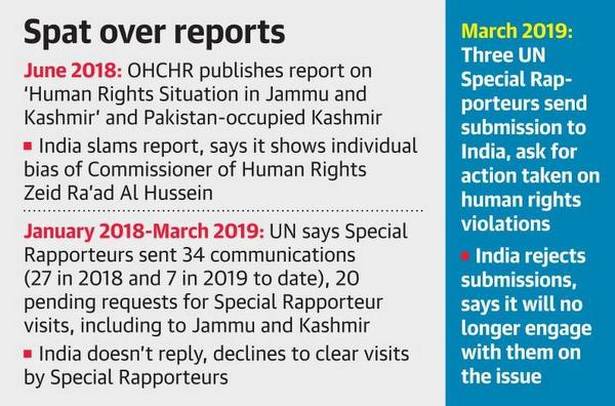Why in news?
- The UN Human Rights Council (HRC) recently sent submissions on the alleged human rights violations in Jammu and Kashmir.
- In reaction to this, India has decided to shut down communication with UN HRC's Special Rapporteurs.
What was it about?
- The current Special Rapporteurs on Extrajudicial Executions, Torture, and Right to Health had referred to an earlier report of the Office of the High Commissioner of Human Rights (OHCHR).
- The OHCHR's was the first-ever such report on J&K as well as Pakistan-occupied Kashmir that came out in June 2018.
- In this context, Special Rapporteurs had written to the Indian government asking about steps taken to address the alleged human rights violations.
- In addition, the Special Rapporteurs had listed “13 cases of concern” from 2018 alone.
- In this, 4 children were among 8 civilians killed by members of the security forces.
- The UN report had come at the same time when another report was released from two NGOs in the State on the alleged cases of torture.
- It was endorsed by a former UN Special Rapporteur.
What is India's stance?
- India has rejected all the claims, and accused the Special Rapporteurs preparing the report of “individual prejudice” against India.
- India had also rejected the OHCHR’s report on the ‘Situation of Human Rights in Kashmir’.
- In its objections, the government said the report was “false and motivated”.
- Its conclusions and recommendations were violative of India’s sovereignty and territorial integrity.
- India also drew notice to the Pulwama attack, calling terrorism the “grossest” violation of human rights, not the allegations against the security forces.
- India refused to respond to questions about deaths of 69 civilians between 2016 and 2018 in violence in the Valley.
- The Indian Permanent Mission to the UN in Geneva replied to the OHCHR that India did not intend to engage further on the issue.

Is India's response justified?
- India's response is largely in line with its reaction to such international reports over the last few years.
- Demands for action against Indian officials and amendment of laws can cross the line on Indian sovereignty.
- The previous OHCHR has called for UNHRC to set up an independent and international tribunal to investigate the matters.
- This was seen to be invasive, and could be dismissed by New Delhi as well.
- However, the government cannot suppress the troubling questions that the UN report and Special Rapporteurs’ submissions raise.
- Notably, most of the sources for the OHCHR report are -
- official Indian authorities
- State and national human rights commissions
- international human rights agencies
- reputed Indian NGOs
- This is therefore a view from within India, and not some disengaged UN official.
- Also, two Kashmiri NGOs report has documented 432 specific cases of alleged brutality by security forces in Kashmir.
- These include electrocution, ‘water-boarding’ and sexual torture of civilians.
- Of these, only about 27 cases were taken up by the State Human Rights Commission.
- It is fair if the government press for due process and justice in each of the cases of human rights violations in J&K.
Source: The Hindu
Quick Facts
UNHRC
- It is an inter-governmental body within the UN system, made up of 47 States.
- It was established in 2006 as part of the UN’s reform process and replaced the UN Commission on Human Rights.
- Members are elected by the UNGA with 3-year terms, with a maximum of 2 consecutive terms.
- They are responsible for promotion and protection of human rights.
- Its resolutions are not legally binding but carry moral authority.
OHCHR
- The role of the Office of the United Nations High Commissioner for Human Rights (OHCHR) is not to be confused with the UNHRC.
- OHCHR is a separate institution which presents reports independent of the HRC. E.g. the June 2018 report on Kashmir
- The HRC and the OHCHR have separate mandate and functions, but both are part of the UN system for human rights protection.
